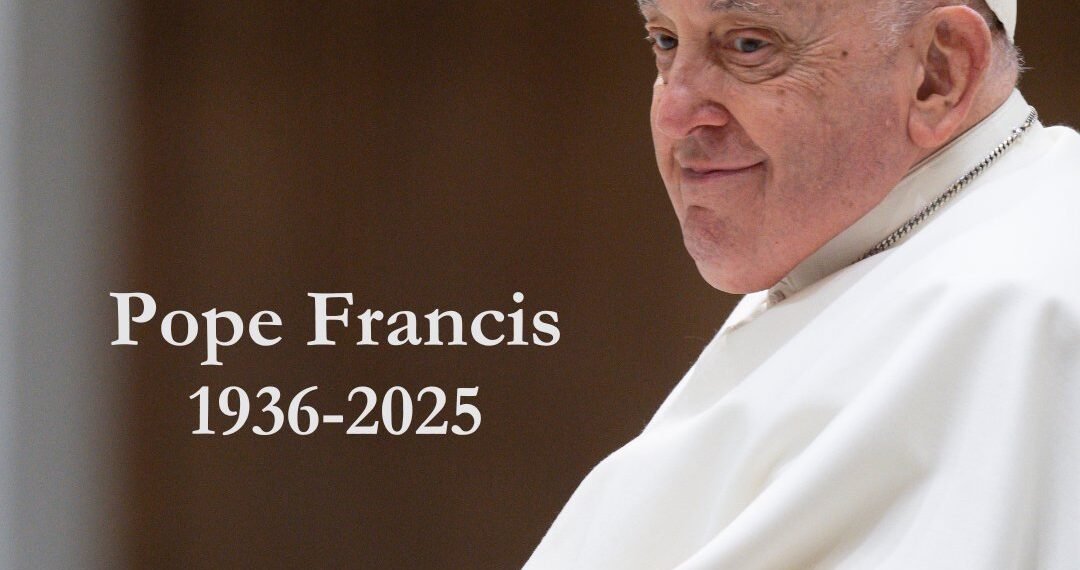The first Jesuit and Latin American pope, Francis reshaped the papacy for the modern era. He championed climate justice, LGBTQ+ inclusion, interfaith dialogue, and the fight against economic inequality.
BY Navin Upadhyay
Pope Francis, the first Jesuit and Latin American pontiff who led the Roman Catholic Church with humility, progressive zeal, and a deep concern for the world’s most vulnerable, died in Rome at the age of 88. The Vatican confirmed his passing on [insert date], following a prolonged respiratory illness that worsened in recent days.
Born Jorge Mario Bergoglio on December 17, 1936, in Buenos Aires, Argentina, Francis was the son of Italian immigrants and trained as a chemical technician before entering the Society of Jesus in 1958. Ordained as a priest in 1969, his early years in ministry were shaped by Argentina’s political unrest and widespread poverty—experiences that would profoundly influence his papacy decades later.
He rose steadily through the Church’s hierarchy, eventually becoming Archbishop of Buenos Aires in 1998 and a cardinal in 2001. Known for his austere lifestyle—riding the bus to work, cooking his own meals—Bergoglio’s humility was a defining trait.
ALSO READ: BREAKING: Pope Francis, Champion of the Marginalized, Dies in Rome
On March 13, 2013, at the age of 76, Bergoglio was elected the 266th Pope of the Roman Catholic Church, taking the name Francis—inspired by Saint Francis of Assisi, a symbol of simplicity, peace, and care for creation. He succeeded Pope Benedict XVI, who had made the historic decision to resign.
As Pope, Francis quickly
Deeply pained by the passing of His Holiness Pope Francis. In this hour of grief and remembrance, my heartfelt condolences to the global Catholic community. Pope Francis will always be remembered as a beacon of compassion, humility and spiritual courage by millions across the… pic.twitter.com/QKod5yTXrB
— Narendra Modi (@narendramodi) April 21, 2025
became known as a reformer. He focused on issues like climate change, economic inequality, immigration, and human trafficking. His landmark encyclical, Laudato Si’, called for urgent environmental action and framed ecological protection as a moral imperative. He emphasized a Church that is “bruised, hurting, and dirty because it has been out on the streets” over one that is self-referential.
Francis sought to make the Church more inclusive, urging compassion over condemnation. He famously said of gay people, “Who am I to judge?” and encouraged dialogue with other faiths, particularly Islam and Judaism. His travels took him to refugee camps, war zones, and countries where Christians are minorities, always emphasizing the Church’s role as a servant of peace and justice.
However, his papacy was also marked by challenges. Despite efforts to confront sexual abuse within the Church, critics accused the Vatican of moving too slowly and lacking transparency. His attempts to decentralize Church authority and open debate on previously closed topics sparked both hope and controversy among clergy and laity.
Pope Francis died during the 2025 Jubilee, a Catholic holy year drawing millions of pilgrims to Rome. His final public appearance was in early February, where he presided over a Jubilee Mass in St. Peter’s Square—visibly frail, but resolute.
Tributes have poured in from across the globe. World leaders, religious figures, and ordinary people have mourned the loss of a spiritual leader who tried to bring the Church closer to the people and the people closer to each other.
Pope Francis will be remembered not only for his doctrinal leadership but for his pastoral presence—for choosing mercy over judgment, simplicity over grandeur, and dialogue over division. In a time of global turbulence, he stood as a moral compass, reminding the world of the enduring power of love, justice, and humility.
Funeral arrangements are expected to follow traditional papal protocol, with a public lying-in-state at St. Peter’s Basilica and a Mass attended by world dignitaries, religious leaders, and the faithful.
He leaves behind a legacy of bridge-building, tireless advocacy for the poor and oppressed, and a call to conscience that will echo through generations.














